Melbourne-born Ben Zygier was a passionate Zionist who aspired to a life of heroism but was responsible for one of the most serious security breaches in Israel's history.

The headstone of the grave of Ben Zygier. Photo: Reuters
One can only speculate about what went through the mind of Melbourne-born Mossad agent Ben Zygier the night he took his own life in Israel's most secure prison cell on December 15, 2010.
Facing a legacy of treachery that is unique in the history of Israel's fabled intelligence agency, Zygier must surely have reflected on the events that moved him to inadvertently betray the country he loved and had sworn to defend.
His dreams of a life of glory shattered, his hopes of redemption crushed, he phoned his mother, Louise, in Melbourne, just hours before his death.

Ben Zygier in the Israeli Defence Force.
It was after 8pm when warders at the Ayalon prison in Ramle, an inland town south-east of Tel Aviv, realised Zygier had not been spotted in his cell for more than an hour. Monitored by three surveillance cameras, the supposedly suicide-proof Cell 15 had been built to house Yigal Amir, the right-wing fanatic who assassinated then Israeli prime minister Yitzhak Rabin in 1995.
Divided into two parts, the cell's larger area contains a bed, a sitting area and a kitchenette, while the smaller section houses a shower and toilet.
When the guards finally entered the cell at 8.19pm, they found Zygier's body hanging cold and lifeless.
"Our job is to isolate him, not to keep him alive", said one of the guards who attended the scene.
Even to his prison guards Zygier was known only as "Prisoner X”; his prison file contained no name, no photo, no legal charges. Thanks to a court-ordered ban on any reporting of Zygier's case by the Israeli media, and his parents' determination to keep their son's death a private affair, only fragmentary details had leaked out.
Aired in public for the first time by the ABC's Foreign Correspondent program last month, the circumstances surrounding his death have remained so mysterious that at least one member of Israel's parliament went so far as to suggest that Zygier had been murdered.
But now, after a months-long investigation, it can be revealed that Zygier – albeit unintentionally – crossed a line that no agent before him had ever crossed.
This investigation began with a phone call to Fairfax Media's Jerusalem bureau in October 2009, and was concluded by a team of reporters assembled by Germany's Der Spiegel magazine.
It involved extensive research conducted in Israel, Lebanon, Italy, Britain and Australia, plus interviews with former friends, business partners, employees of several intelligence agencies and governments, and with Zygier himself shortly before his arrest.
This is the story of the tragic downfall of a passionate Zionist, a young man who had aspired to a life of heroism, and yet, in the wake of his own shortcomings, willingly gave away such sensitive information to the enemy that it represents one of the most serious security breaches in Israel's 65-year history.
Growing up in Melbourne's south-eastern suburbs, Zygier enjoyed the happiest of upbringings. His father, Geoffrey, ran the family muesli company before selling the business and taking on senior roles within Melbourne's Jewish community, including a stint as chief executive of the Jewish Community Council of Victoria.
Educated at the King David School, and later at Bialik College, Ben Zygier joined the left-wing Zionist youth movement Hashomer Hatzair. After high school, he began a law degree at Monash University before announcing to family and friends that he was taking time out to live in Israel, where he ended up at Kibbutz Gazit.
Located in the north of the country, in the hills surrounding the Sea of Galilee and close to Israel's border with Lebanon, Kibbutz Gazit is home to about 500 people, including 40-year-old Daniel Leiton, a tall, strong-looking man with big hands and a thick Australian accent.
"Ben was an amazing man," says Leiton, who describes Zygier as one of his best friends. “Cheerful, friendly, warm."
Leiton recalls first meeting Zygier in the late '80s in Melbourne. Even then, he says, the two teenagers shared a passionate belief in Zionism, with Zygier already making it clear he would make Aliyah, the act of immigration for diaspora Jews to the land of Israel. The last time Leiton saw him was in Melbourne, early in 2010, only weeks before Zygier was arrested.
Asked if he noticed him behaving strangely, or whether he seemed tense, or anxious, Leiton says no. “He was as always.”
Unable to imagine his friend locked up in solitary confinement in the high-security Ayalon prison, even less that he was a Mossad agent, Leiton still finds it difficult to comprehend Zygier's apparent suicide. “Unbelievable,” he says.
Another friend of Zygier's was Lior Brand, who shared a living space with Zygier and Leiton at Kibbutz Gazit, and who describes Zygier as “obviously clever, and ready to defend Israel against its enemies, no matter what the cost”.
After living at Kibbutz Gazit, and taking Israeli citizenship under the adopted Hebrew name of Ben Alon, Zygier flitted back and forth between Israel and Australia, in turn completing his law degree at Monash, and completing his military service in Israel.
In this tiny strip of a nation surrounded only by countries either overtly or surreptitiously hostile to its existence, one agency in particular stands ready to accept such people into its ranks: the Institute for Intelligence and Special Operations, known the world over by the Hebrew word for “institute” as the Mossad.
Engaged in a furious shadow war against its enemies, the Mossad's exploits in recent years include the car-bomb assassination of Hezbollah commander Imad Mughniyeh in 2008, the January 2010 killing of Hamas operative Mahmoud al-Mabhouh in Dubai and the slaying of at least five Iranian nuclear scientists.
Always on the lookout for Israel's best and brightest talent, at the beginning of the last decade the Mossad began its first-ever public recruitment drive, complete with advertisements promoting “the job of a lifetime”.
“The Mossad is open – not for everyone, but for a few. Maybe for you," said the tagline.
The advertisements caught Zygier's eye, and he responded to the Gmail address at the bottom of one of the ads. For an agency like the Mossad, which depends on its ability to send its agents unsuspected behind enemy lines, foreign-born nationals like Zygier offer an inherently valuable bonus – access to a genuine foreign passport that bears no link to Israel.
At the beginning of 2003, after he had completed an articled clerkship at the Melbourne offices of corporate-law firm Deacons (now Norton Rose), Zygier took a leave of absence and moved to Tel Aviv, where he won a trainee position at prestigious Tel Aviv law firm Herzog, Fox & Ne’eman.
In actual fact, by this time Zygier was already being screened by the Mossad and he was awaiting news that his application would be successful. As part of that screening process, candidates are interviewed by psychologists looking for obvious flaws or personality traits that might disqualify them from a career in a clandestine intelligence service.
‘‘We’re looking for mentally stable people,’’ says one Israeli psychiatrist who is familiar with the recruitment process.
By December 2003, Zygier had received the good news he was hoping for and was formally accepted to undergo an intense year-long training program that included mastering such techniques as how to falsify resumes and other documents, and how to manipulate people.
By early 2005 he was ready for his first mission. He was sent to Europe, where he was instructed to infiltrate companies that had business relationships with countries including Iran and Syria.
One company Zygier had contact with was a high-tech firm in Milan, Italy. Despite initial information provided to Fairfax Media that this company might be a front company owned and operated by the Mossad, subsequent investigations have determined conclusively that this is not the case.
According to Israeli intelligence sources, Zygier also chased other opportunities in eastern Europe and the Balkans.
One chief executive of a mid-sized European company with extensive business interests across the Middle East and Persian Gulf – including Iran – confirmed that he had hired Zygier for an accounting position.
The CEO described Zygier as “extremely sharp”, and said that while it became obvious Zygier was not trained in accounting, despite his claims, he nevertheless managed to master the requisite skills quickly.
But, having mastered the job and usually being able to finish a full day’s work by as early as 11am, Zygier then started to lose interest in his regular duties. Because of his evident talent, a decision was made to re-assign him to another role within the company that focused on customer relations.
A similar pattern emerged. . Zygier initially thrived in the new role but then began to lose interest to the extent that it started to adversely affect relations with customers.
The CEO said Zygier began behaving rashly with clients, finally causing one major client to sever its links with his company.
And despite his intelligence, Zygier displayed a lack of commitment to the tasks he was assigned within his company, the CEO said. “So, we had to let him go.”
When confronted with the news Zygier was actually a full-time employee of the Mossad, the CEO said he had struggled to process the fact that his company – a legitimate concern that he had built largely on his own – would have been targeted by Israeli intelligence.
The CEO said that while his company had significant business interests across the Middle East, Zygier never travelled as part of his job and had no face-to-face contact with clients.
He said that never at any stage during the 18 months that he employed him were suspicions raised that Zygier was the clandestine figure he later proved to be.
He said he also remained unsure what advantage, if any, Zygier would have been able to gain on behalf of Israel while working for his company.
By mid 2007, Zygier had, in the eyes of his Mossad superiors, performed without much success. He couldn’t deliver, at least not enough of what Mossad wanted, so a decision was made to bring a reluctant Zygier back from the field to a desk job.
He was ‘‘neither particularly bad nor particularly good, but mediocre,’’ says an Israeli source familiar with Zygier’s case.
Inside the Mossad’s hexagonal headquarters off Tel Aviv’s highway No.5, the agency is divided into three main sections. Keshet, which means rainbow in Hebrew, is the first section, and is responsible for surveillance and other forms of covert intelligence gathering.
The Caesarea department, which is named after the nearby ancient Roman settlement, is home to the Mossad strike force, the men and women who prepare and execute attacks abroad. The largest section is called Tzomet, which is Hebrew for crossroads, a more bureaucratic, less glamorous section that deals mainly with the evaluation and analysis of the information coming in.
For someone like Zygier, this must have been a blow to his self-esteem, with former Mossad insiders describing the work for Tzomet as bureaucratic, complete with routines and supervision an agent can break free from when working abroad.
According to Mossad insiders, organisational changes within Tzomet have meant that once strictly segregated smaller units have been merged into larger teams, with the information being handled across the section becoming more visible to the people working there.
Yet, as subsequent events indicated, this concept of transparency within had a fundamental flaw – giving Tzomet employees like Zygier access to so much information actually makes them vulnerable.
During the early hours of Saturday, May 16, 2009, Lebanese special forces stormed the house of Ziad al-Homsi in the village of Saadnayel in the western Bekaa Valley, dragging the startled 61-year-old from his bed.
According to the arrest warrant, Homsi was accused of being an Israeli spy. The warrant even stated his Mossad codename: the Indian.
The arrest came as a shock to many Lebanese, not just because Homsi had been the mayor of his town for years. He was also treated as a war hero because he had fought against Israel on the side of the Palestine Liberation Organisation and the Syrian army during the Lebanese civil war. But, as his friends and family were to soon learn, Homsi had, since 2006, been recruited to work as a spy for Israel, receiving about $US100,000 for his services.
Leaked details from Homsi’s interrogation underscore how important he was to the Mossad, with Homsi revealing he had told his Israeli handlers he could lead them to Hassan Nasrallah, the leader of Israel’s mortal enemy, Hezbollah, who has lived in hiding for years, thereby paving the way for another assassination.
The indictment against Homsi revealed the elaborate lengths to which the Mossad went to recruit him. According to Homsi, a Chinese man named ‘‘David’’ had come to his village in Lebanon, introducing himself to Homsi as an employee of the City of Beijing’s foreign trade office, and claiming that he wanted to establish business ties in Lebanon.
At a meeting in Lebanon, ‘‘David’’ invited Homsi to Beijing to attend a trade fair, telling him that the invitation had come directly from the Chinese government.
Homsi enjoyed a successful visit to Beijing, where he was promised a salary. Later, he was invited to another meeting abroad, this time in Bangkok. But instead of talking business, the people on the other side of the table started asking Homsi what he knew about three Israeli soldiers who had been missing since a 1982 battle that Homsi himself had fought in on the side of the Arabs.
‘‘This is the moment at which the defendant becomes aware that he is dealing with Israelis, who work for the Mossad and have nothing to do with import-export companies or services that search for missing people,’’ reads the Homsi indictment.
Homsi agreed to work for the Mossad, which provided him with a computer and a doctored USB flash drive, as well as a device that looked like a stereo system but was in fact a transmitter for sending messages, all of which were seized after his arrest.
Homsi, says General Ashraf Rifi, the head of Lebanese intelligence, was one of the most important catches his agency had ever made. Homsi was later sentenced to 15 years in prison with hard labour.
The spring of 2009 was a busy time for Lebanese intelligence, which managed to crack open several Israeli spy rings. Another of those arrested was Mustafa Ali Awadeh, code name ‘‘Zuzi’’, another important mole within Hezbollah.
For the Israelis, it was the biggest intelligence setback in the Levant in decades. Officials at Mossad headquarters were baffled. How did the Lebanese manage to track down these men?
An even greater stir was created at Mossad headquarters when it received a tip there had been talk in Hezbollah about a Mossad agent who was currently in Australia and who may be in some danger. It was soon clear that the agent had to be Ben Zygier.
Zygier, frustrated by his desk job, had requested a leave of absence to undertake a master’s of management degree at Monash University.
The Mossad personnel department approved the request and by the beginning of 2009 Zygier had enrolled under the name of Benjamin Allen and was back living in Melbourne.
He told a fellow student that he had worked for the PricewaterhouseCoopers management consulting firm in Geneva, and that he occasionally had to return to Switzerland for the firm. It explained his many trips.
‘‘Ben was obsessed with the notion of keeping fit,’’ a former fellow student recalled.’’ He always ate well and paid attention to his health.’’
In October 2009, Fairfax Media received a tip from an Australian source about three dual Australian-Israeli citizens suspected of working on behalf of Israeli intelligence, using their Australian identities as cover. One of the names supplied was that of Ben Zygier, but when Fairfax confronted him with the allegations in December 2009 and January 2010, he vociferously denied all such suggestions, dismissing the information as fanciful.
In early January 2010, Zygier’s Mossad superiors decided to call him back to Tel Aviv, not because they yet suspected him of leaking information to the Lebanese, but out of concern for his safety, which stemmed from the tip that Hezbollah appeared to know his identity.
Zygier’s superiors had also received reports that he had breached protocol by talking openly about the fact he was a Mossad agent, and wanted to warn him to be more discreet.
It was not until Zygier was back in Israel, where it was thought that there was something odd about his behaviour, the suspicion arose that he might have had a role in the arrests in Lebanon.
By January 29, 2010, that suspicion was sufficient to order members of Israel’s General Security Service, better known by its two-letter Hebrew abbreviation as the Shin Bet, to arrest Zygier. The story they uncovered during the internal investigation that followed shocked them.
Zygier, apparently frustrated by his demotion to a desk job, had decided to take matters into his own hands and find a way to rehabilitate his reputation in the organisation.
Under intense questioning from the Shin Bet, he broke down and admitted that sometime in 2008, before he took his leave of absence and moved to Australia, he had flown to eastern Europe to meet a man he knew to have close links with Hezbollah, with the intention of turning that person into a double agent.
Instead, the man reported the recruitment attempt to Beirut, and himself began playing the same game as Zygier, except in reverse. Without Zygier’s knowledge, the man was reporting every detail of his contact with Zygier back to the Hezbollah leadership in Beirut. Israeli officials believe even Hassan Nasrallah himself was being kept informed.
The contact between Zygier and the man went on for months. When the man asked Zygier for proof he was a real Mossad agent, Zygier readily complied and began supplying him with real intelligence from Tel Aviv, including the names of Ziad al-Homsi and Mustafa Ali Awadeh, the Mossad’s two top informants in Lebanon.
Israeli officials with access to the probe say that when Zygier was arrested, he was also found carrying a compact disc with additional classified information from the Tzomet department, which they believe he was also preparing to hand over to the other side.
At a meeting in Tel Aviv this month, a black limousine with darkened windows drove into a public car park, bringing a reporter to a meeting with an Israeli government official.
‘‘Zygier wanted to achieve something that he didn’t end up getting,’’ said the official, who is familiar with the investigation. ‘‘And then he ended up on a precipitous path. He crossed paths with someone who was much more professional than he was.’’
At some point, he says, Zygier crossed a red line and went to the dark side. His fate, the official points out, was largely a matter of psychology.
Israeli informants have certainly changed sides in the past. But a regular Mossad employee has never done what Zygier did. It is a bitter defeat for the Mossad, but for Hezbollah it is one of the rare instances in which an Arab intelligence service prevailed over its Jewish counterpart.
Zygier’s actions are also a heavy blow to the Mossad because they raise doubts as to the integrity of the agency’s own people – and the manner in which it recruits employees.
Lior Brand, one of Zygier’s friends from Kibbutz Gazit, believes Zygier simply wasn’t up to the task. The lies, the silence and the loneliness were too much for him, says Brand, adding the Mossad ‘‘made a big mistake’’ by recruiting him. He says he will never forgive it for recruiting the wrong person.
Negotiations over Zygier’s sentence were conducted behind the scenes in December 2010. The Mossad and Shin Bet wanted to set an example and demanded he spend at least 10 years in prison.
While he was in prison, in the summer of 2010, Zygier’s second daughter was born, and the family was permitted to visit him occasionally. What truly motivated Ben Zygier? Was it wounded pride? Vanity? A lack of professionalism?
Perhaps his parents could answer these questions, but they have chosen to stay silent. What can be ruled out is that money played any role.
After Israeli officials released Zygier’s body, the family invited his closest friends to the funeral, including Daniel Leiton from Kibbutz Gazit. Leiton went to the cemetery and asked why Zygier had to die, but he didn’t get an answer. ‘‘No one talked about why, at 34, he suddenly died.’’
Leiton says that while he still loves Israel, something went terribly wrong in this case.
The inscription engraved on Zygier’s polished black tombstone in a cemetery in Springvale reads : ‘‘Blessed be the judge of truth.’’
Jason Koutsoukis is a former Fairfax Middle East correspondent.









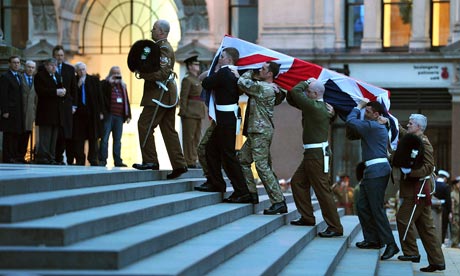
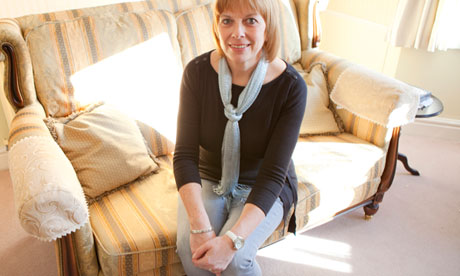
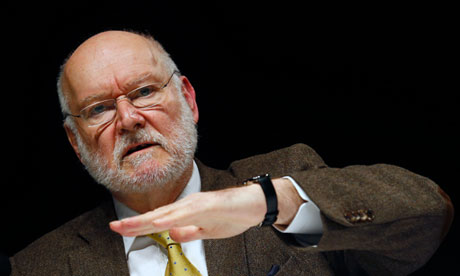


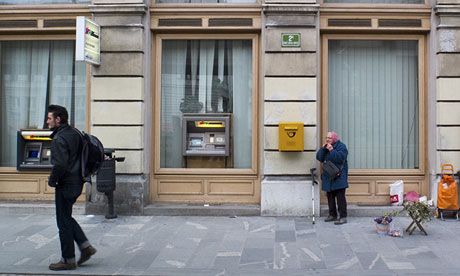

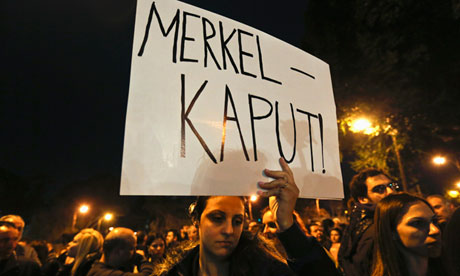
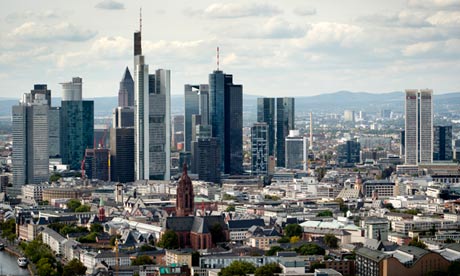 Economic powerhouse … Frankfurt’s financial district, where the ECB’s HQ is located. Photograph: Odd Andersen
Economic powerhouse … Frankfurt’s financial district, where the ECB’s HQ is located. Photograph: Odd Andersen 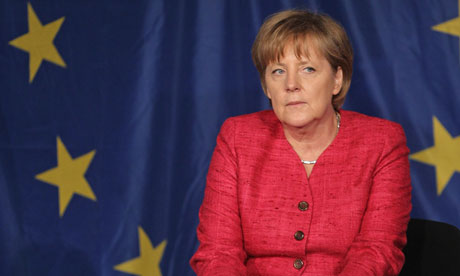 The prudent housewife … Angela Merkel sits before an EU flag on a visit to a Berlin school, 2011. Photograph: Sean Gallup
The prudent housewife … Angela Merkel sits before an EU flag on a visit to a Berlin school, 2011. Photograph: Sean Gallup  Cultural export … German comedian Henning Wehn.
Cultural export … German comedian Henning Wehn.